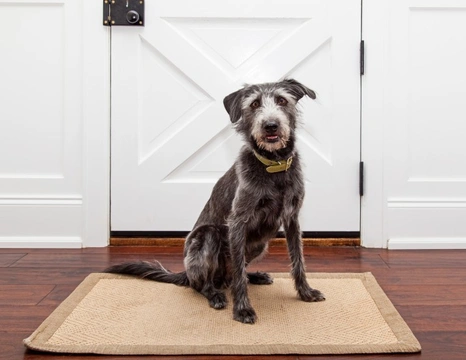
Why does my dog sit by the door for long periods of time?
Assuming that your dog is housetrained, you are probably very observant of the cues that they provide to tell you that they need to go out to do their business, and these cues can vary from dog to dog. Standing or sitting by a door waiting to go outside – or crying or pawing at the door – are generally clear indications that your dog needs to go to the loo, but this is not always the case.
If your dog tends to spend long periods of time sitting or standing staring at a door and it’s not because they need to do their business, the chances are that you are wondering what this behaviour means, and what your dog is trying to tell you. In this article we will cover some of the most common reasons for your dog sitting for long periods of time at the door, to help you to understand what they are trying to tell you. Read on to learn more.
They need the toilet
The first thing you should consider is that your dog might need to go out to the toilet, even if they usually have a very regular routine in terms of when they need to go. If your dog does need to do their business and you ignore them, they are likely to become progressively more anxious and vocal about asking to go out, and may of course toilet in the house if they cannot do so.
If your dog usually has a regular toileting routine but seems to be needing to go out to the loo more often or more urgently than normal, they might have a health issue or be unwell, so bear this in mind and speak to your vet if needs be.
When are you coming home?
If your dog’s favourite person has gone out – or is due home – your dog may well sit patiently at the door awaiting their return, particularly if you tend to come and go at the same sort of time each day. Even if you go out and leave the house empty aside from your dog, many dogs will sit and watch for your return at a door or window for a while after you have gone, or at the time that they expect you back.
The mating instinct
If you have either a male or a female unneutered dog, their hormonal drives will have a significant impact on their day to day behaviour. If your male dog has picked up the scent of a bitch in heat they will become highly driven and obsessive about getting out and finding them, which can cause your dog to sit or paw at the door for long periods of time in the hopes of getting out to find a mate.
Boredom
Dogs need to have toys and things to do to entertain themselves with and keep them from becoming destructive, as well as plenty of exercise, interaction with you and periods of play and socialisation.
If your dog is bored or not getting enough exercise, they might sit by the door hoping for someone to let them out to play or find something interesting to do.
They’re reading your cues
Most dogs know instantly when you’re getting ready to take them for a walk, and picking up their leads, a ball, or otherwise following a routine before a walk will tip your dog off and usually, generate a lot of excitement.
If your dog is raring to go, they may well head for the door and sit or stand there waiting for you to let them out or head out on their walk.
What’s going on outside?
Dogs will often while away the day by looking through a door or window at the world passing by outside, and if the outside world is busy or interesting, they might spend a lot of time by the door watching, scenting and listening to the local entertainment.
If there is a lot going on outside and your dog spends large parts of their day wishing they were involved in it, they might become quite opportunistic about pushing or running out of the door when you do open it. Ensure that your dog isn’t bored or frustrated, and teach them good manners when it comes to their behaviour around entries and exits to ensure that they don’t push past you or run off as soon as they get the chance!
Guarding and territorial behaviour
Dogs tend to be quite territorial animals as a whole, and guarding or watchdog behaviour is common in many of our canine companions. This may result in your dog sitting or standing watch at a door, or spending a lot of time at the door if people keep approaching your house.
Again, ensure that your dog isn’t overly territorial, and work to calm their reactions if they are very defensive about people approaching.



